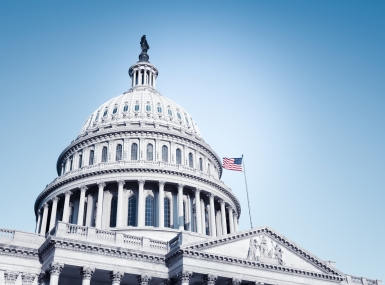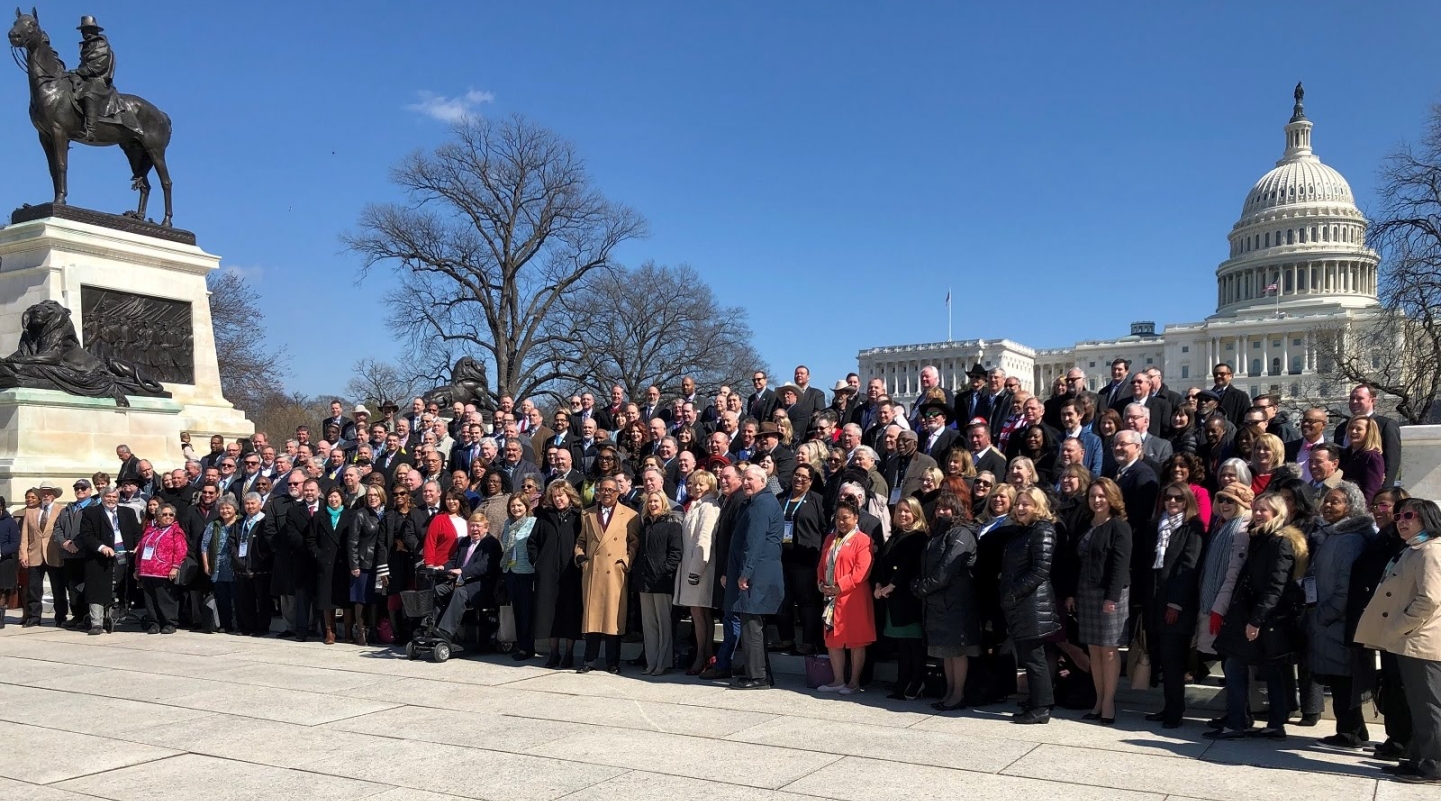Advocacy Hub
Through NACo, advocate for county priorities in federal policy making

Explore County Federal Policy Priorities
NACo supports federal policies and programs that equip county governments with the resources and flexibility needed to serve our residents.
Below, explore highlights of our key federal policies, and click here to view NACo's 2025 policy priorities.
County Federal Policy Priorities
Foster bipartisan support for direct federal investments that flow through counties
NACo supports legislation that recognizes counties as essential intergovernmental partners through long-term direct investments in local governments. Counties are on the front lines of implementing federal funds at the local level, ensuring resources are used effectively to strengthen the nation’s infrastructure, health systems, economic development and local and national economies. As owners and operators of much of the nation’s critical infrastructure and providers of essential public services, counties are uniquely positioned to deliver impactful results that address the distinct needs of our communities.
We urge federal partners to work closely with counties to ensure funds are directed locally, empowering us to meet the diverse and pressing needs of our constituents. Counties are best equipped to understand the challenges and opportunities within our jurisdictions, making us indispensable partners in implementing federal programs. By providing direct investments to counties, the federal government can ensure resources are deployed efficiently, fostering innovation, resilience and economic vitality nationwide.
Advocate for a fair and flexible tax policy framework that safeguards local revenue sources and flexibility for essential county services
Key provisions of the Tax Cuts and Jobs Act of 2017 (P.L. 115-97) are set to expire on December 31, 2025, including but not limited to marginal rate reductions across most tax brackets, the expanded standard deduction, the Child Tax Credit (CTC) and the $10,000 cap on the state and local tax (SALT) deduction. As the 119th Congress considers extending or making permanent many of these provisions, counties have an opportunity to advance key policy priorities while ensuring critical revenue sources are protected. Counties generate revenue and reinvest nearly $743 billion annually into local communities, funding essential services like infrastructure, public safety and economic development.
County priorities include:
- Restoring the state and local tax deduction to strengthen local authority and the balance of federalism in the tax code while promoting homeownership
- Reinstating the tax-exempt status of advance refunding bonds to help counties finance critical infrastructure projects at lower costs
- Extending, expanding or establishing key tax credits that support vulnerable residents, including the Child Tax Credit, Earned Income Tax Credit and Low-Income Housing Tax Credit
As Congress weighs options to offset the potential costs of extending the 2017 tax reform law, NACo urges lawmakers to preserve the tax-exempt status of municipal bonds. Municipal bonds are a critical local financing tool, helping counties fund more than $3.3 trillion in infrastructure investments over the past decade. Municipal bonds are typically issued as tax-exempt, meaning the interest earned by investors is not subject to federal taxation. This tax advantage makes municipal bonds a low-risk investment that can be issued at lower yields, ultimately saving taxpayers money. On average, tax-exempt municipal bonds reduce borrowing costs by 2.1 percentage points compared to taxable bonds. Without the tax exemption, state and local governments could face an additional $823.9 billion in borrowing costs through 2035.
Pass a bipartisan Farm Bill with the inclusion of county priorities
The Farm Bill authorizes key programs that help counties make critical investments in infrastructure, economic development, workforce training, nutrition and conservation. Preserving and expanding these programs is vital to the continued prosperity of all counties and the residents we serve.
With the current legislation set to expire on Sept. 30, 2025, counties are encouraged to connect with lawmakers now to ensure a five-year, bipartisan Farm Bill that includes key county priorities. For the nearly 70 percent of America’s counties, parishes and boroughs classified as rural, the Farm Bill represents a significant opportunity to address the unique challenges facing rural communities. Programs authorized through the bill help rural counties strengthen infrastructure, deliver essential public services, protect the nation’s food supply, expand access to healthy food, and promote locally led conservation initiatives.
The Farm Bill also plays a key role in ensuring county residents have access to affordable, nutritious food. It authorizes the Supplemental Nutrition Assistance Program (SNAP), the nation’s largest federal nutrition program, which provides monthly grocery benefits to 42.6 million low-income individuals. Counties often contribute significant local funds to help administer and supplement the program’s costs.
NACo supports the inclusion of legislation that would strengthen county engagement in federal land management, rural development and childcare services, including:
- The Treating Tribes and Counties as Good Neighbors Act, which would allow counties to retain funds from joint land management projects under the Good Neighbor Authority program
- The Rural Partnership and Prosperity Act, which would provide multiyear, flexible funding for rural development initiatives, and
- The Expanding Childcare in Rural America Act, which would prioritize rural development funding for projects that enhance childcare services in rural communities.
Promote better outcomes in behavioral health, homelessness and criminal justice systems
Counties invest billions annually to improve health outcomes for residents, leveraging key federal programs such as the Community Mental Health Services Block Grant and the Substance Use Prevention, Treatment and Recovery Block Grant. These programs fund essential services, including housing assistance, case management, school-based supports and peer services, helping counties address the ongoing mental health crisis. To sustain our impact, Congress must fully fund these programs.
The federal-state-local Medicaid partnership is essential for strengthening care systems and expanding access for vulnerable populations. Enhancing this partnership allows counties to continue our dual role as administrators and investors in health care, supported by initiatives such as the Prevention and Public Health Fund.
Counties also advocate for policies that remove barriers to care for justice-involved individuals. Congress is urged to amend the Medicaid Inmate Exclusion policy to reduce overall costs and improve resident outcomes. Additionally, full funding for programs such as the Justice and Mental Health Collaboration Program is critical to supporting mental health screening and treatment in jails.
Support counties With federal public lands by fully funding Payments in Lieu of Taxes (PILT) and the Secure Rural Schools (SRS) programs
Counties support maintaining long-term full funding for the Payments in Lieu of Taxes (PILT), which compensates public lands counties for untaxable federal land. Without predictable mandatory funding, PILT will remain a discretionary program subject to the annual appropriations process. Public lands counties rely on PILT to provide critical services like infrastructure maintenance, clean water delivery and law enforcement to residents and visitors alike. Counties urge the administration and members of Congress to support long-term, predictable full funding for PILT in FY 2024 and beyond, and modifying the program to make PILT payments to counties with smaller populations more equitable. Counties also support extending the Secure Rural Schools (SRS) program as a transitional funding mechanism until the federal government fully implements a sustainable, long-term forest management program with adequate revenue sharing for forest counties and schools. NACo supports legislation such as the Secure Rural Schools Reauthorization Act that provides forest revenue-sharing payments to counties and promotes active natural resource management.
NACo will continue to urge leadership in both chambers and on both sides of the aisle to work together to enact a long-term, sustainable solution to ensure stable revenue sources to national forest counties. Furthermore, counties support legislation and policies which would ensure federal land management agencies aggressively reduce the excess wildfire fuels on the entire National Forest System. The annual average number of acres burned has grown dramatically from 3.3 million acres per year in the 1990s to 7 million annually since the year 2000. Counties support legislation for financing the suppression of catastrophic wildland fires without borrowing from other agency accounts for active management for forest and rangeland health and post-fire restoration and mitigation. Counties oppose any attempt to shift the costs of wildland fire suppression from federal agencies to counties.
Promote county priorities and local decision-making in federal rulemaking around land use, environmental quality and energy development
Counties support federal policies that balance environmental protection, public health, safety and local economic needs. As both regulators and regulated entities, counties are responsible for protecting local air, water and land resources under delegated authority from state and federal laws. Federal regulations and guidelines are most effective when they are clear, understandable and easily administered at the local level.
As the Environmental Protection Agency (EPA) and other federal agencies develop future regulations, NACo supports meaningful consultation with county governments early in the rulemaking process, and federal investments should be implemented more quickly by reforming the permitting process. Early engagement helps prevent unfunded mandates and other unintended consequences that could arise from implementing federal policies. Additionally, NACo supports increased federal funding and flexibility to counties to ensure the successful implementation of future regulations.
Enhance the nation's disaster mitigation, response and recovery efforts by strengthening intergovernmental partnerships
Counties play a vital role in all aspects of emergency management, including planning, preparation, mitigation, response and recovery. As the frequency and costs of disasters continue to rise, counties urge Congress and the administration to provide increased federal resources to help protect residents, property, infrastructure and local economies.
Counties support reforms to the Federal Emergency Management Agency’s (FEMA) Public Assistance Program to ensure expedited reimbursement for communities after disasters. Additionally, counties call on Congress to pass long-term reauthorization and reform legislation for the National Flood Insurance Program (NFIP) to improve affordability, mitigation assistance, flood risk mapping and program administration. The NFIP reduces the impact of flooding on public and private structures by providing affordable insurance and encouraging communities to adopt and enforce floodplain management regulations.
Furthermore, counties support increased funding for the Emergency Management Grant Program and other mitigation grants to strengthen local hazard mitigation and preparedness efforts.
Expand federal flexibility, incentives and resources to empower county investments, policies and services
Counties play a vital role in fostering economic growth, supporting labor market recovery and building resilient communities. We advocate for federal investments such as the Economic Development Administration (EDA) to strengthen local economies through infrastructure development, workforce initiatives and public-private partnerships. Counties also call for increased funding for the Community Development Block Grant (CDBG) program, which improves housing, expands economic opportunities for low- and moderate-income residents and helps local governments address critical challenges.
To combat the affordable housing crisis, counties support modernizing the tax code to incentivize housing development and expanding programs such as the Low-Income Housing Tax Credit (LIHTC). Additionally, counties urge Congress to reauthorize the Workforce Innovation and Opportunity Act (WIOA) to address local workforce needs and emerging economic challenges while also preserving local flexibilities and resources.
Counties are also critical partners in delivering human services, advocating for expanded federal resources to combat poverty, strengthen families and support vulnerable populations. This includes increasing investments in child care, modernizing the Child Tax Credit and improving child welfare programs. Counties also support comprehensive immigration reform that imposes no unfunded mandates on local governments.
Counties call for reauthorizing the Temporary Assistance for Needy Families (TANF) program to preserve flexibility while enhancing support for family self-sufficiency. We remain committed to working with Congress and federal agencies to ensure policies promote vibrant communities, economic stability for all residents and local flexibility with accountability.
Ensure access to affordable and reliable technology solutions while preserving local decision-making
Counties have an opportunity to lead in innovation by leveraging emerging technologies, including artificial intelligence (AI), to enhance local government services while ensuring residents have robust access to 21st-century communications infrastructure. AI-driven tools can help optimize broadband expansion efforts, improve service delivery, and bridge the digital divide.
County-supported technology initiatives:
- Attract and retain high-speed internet service that is affordable, reliable, and accessible for all residents, particularly in rural and underserved areas, using AI-driven data analysis to identify coverage gaps and optimize deployment strategies.
- Prioritize the county role as early partners and collaborators in wireline and wireless telecommunications siting decisions and preserve local autonomy in the management of public rights-of-way.
- Promote emerging technologies, including AI-powered solutions, to improve the effectiveness of local government services while prioritizing cybersecurity infrastructure needs and mitigating risks.
Federal funding programs, including the Broadband Equity, Access, and Deployment (BEAD) program and the State and Local Cybersecurity Grant Program (SLCGP), provide critical grant funding streams to support county technology policy priorities. Successful implementation requires strong local coordination with counties to ensure projects effectively meet local needs, leveraging AI for enhanced data-driven decisionmaking.
Maintain election integrity and strengthen election worker safety
In the United States, the nation’s 3,069 counties administer and fund elections at the local level, overseeing polling places and coordinating poll workers for federal, state and local elections. County election officials work closely with federal, state and local partners to ensure the accuracy, security and accessibility of voting systems.
Counties oppose legislation that imposes impractical election requirements that negatively affect the administration of state and local elections. Counties support legislation that requires federal entities to collaborate with local governments to strengthen election cybersecurity and allocate funding directly to counties.
In recent years, election officials have faced an increase in targeted threats and harassment. NACo urges Congress to enact legislation that imposes penalties for harassing or intimidating election officials in the performance of their duties.
NACo also urges Congress to reintroduce and pass legislation that strengthens protections for election officials and enhances security measures for election infrastructure and workers. This includes support for the Election Worker Protection Act.
Membership Series
First 100 Days
Join NACo's Membership Series: First 100 Days for timely updates and incisive analysis on federal policies and actions that directly affect counties during the early Trump administration. Gain essential insights into federal funding, regulations, and intergovernmental partnerships to help shape your county's priorities and operations.

Advocacy Updates
Dive Deep
Access toolkits and resources to drive your own advocacy efforts on today's pressing issues.

American Rescue Plan Resource Hub
State and Local Coronavirus Fiscal Recovery Fund provided $65.1 billion in direct, flexible aid to every county in America. In this resource hub, find stories of counties investing these resource to support our residents, technical assistance in implementing these programs in your county and our latest analysis and research.

Farm Bill Reauthorization Resource Hub
Explore NACo resources, stay up-to-date on the state of play and advocate for key county priorities in the Farm Bill.

Supreme Court Advocacy Hub
Through our partnership with the Local Government Legal Center, NACo works to raise awareness of the importance of Supreme Court cases to county governments and help shape the outcome of cases of significance at the Supreme Court through persuasive and effective advocacy.

Medicaid Inmate Exclusion Policy (MIEP) Advocacy Toolkit
Find resources designed to help county officials educate Congress, the administration and the public on the importance providing access to federal health benefits for those awaiting trial and verdict decisions.

Waters of the U.S. Resource Hub
The definition of WOTUS directly impacts county governments as owners and operators of local infrastructure.

Payments in Lieu of Taxes Resource Hub
PILT provides payments to counties and other local governments to offset losses in tax revenues due to the presence of substantial acreage of federal land in their jurisdictions.














